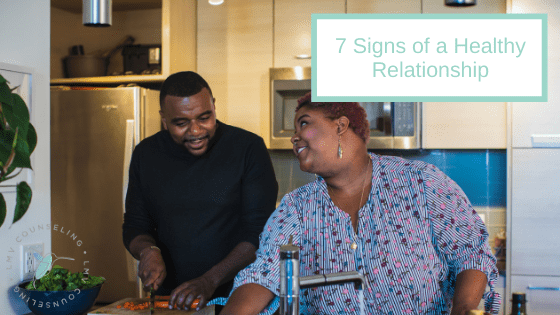Signs of a Healthy and Strong Relationship
We get asked all the time- how can I make sure I stay with my partner? Relationships are hard work. It takes a lot of love, sacrifice, and dedication. It often times is the light in our lives and where the deepest joy comes from. Who wouldn’t want that to last?
The Gottman Institute was founded by John and Julie Gottman, leaders in the relationship research field. Their work spans 40 years of research with thousands of couples. The Gottman’s have researched relationships extensively and have looked at marital stability and divorce prediction. They have utilized biological markers, such as pulse oximeters, to measure reactions our body’s experience when thinking about and communicating with our partners. Gottman’s research has led him to believes with a high accuracy (95%) if couples will divorce after watching them for an hour. Wow! We better listen up! From this research, they have determined seven signs of a healthy relationship.
 7 Signs of a Healthy Relationship
7 Signs of a Healthy Relationship
Knowing each other well.
The foundation of a strong relationship is friendship. Becoming friends and maintaining a friends means a couple is less likely to divorce. Strong couples make an effort to know their partners world and are interested in the details like knowing names of co-workers, their interests, kids teachers, etc. Research shows that infidelity generally happens after the friendship has gone stale.
Working to like each other.
In the beginning of relationship, each person is thrilled to learn more about the other person. Where did they come from? What are their interests? Hobbies? You fall in love with that person and you like that person. They become special to you and you favor them over other relationships. Happy couples continually remind themselves of each other’s good points. They look for the qualities they enjoy in their partner. They remind themselves of the cute idiosyncrasies. They remember and access good memories from the beginning of the relationship and are grateful for each other.
Acknowledging and reassuring each other.
Strong couples rely on one another for reassurance and seek out connection. They “turn toward” one another when one partner makes a bid for connection. These two things mean the small behaviors that a partner displays to shows they care and a show (ranging from subtle to obvious) of a desire for connection. For example, you come home after a stressful day and sit on the couch with your partner. You sit close to your partner and touch their leg. This is a bid for connection. You’re hoping your partner will acknowledge this and inquire. If the partner reciprocates with putting down their phone, making eye contact and saying, “hey what’s up?” this is turning towards. Happy couples do this often.
Taking spouses opinions into account.
Happy couples change their minds to accommodate partners. Couples can become resentful and dissatisfied when they are asked for their opinion but their partner never considers it. They take their partners happiness seriously. This helps strengthen the relationship by helping each person feel like they really matter.
Solving solvable problems.
Conflict and problems inevitably rise when two parties are involved. Solvable problems are specific and immediate issues that arise and can be settled using “repair attempts”: actions taken by a partner to diffuse the tension and keep a conflict from escalating out of control. His research states successful use of repair attempts is one of the greatest predictors of relational success.
Accepting perpetual conflicts.
Most couples have conflict that arises again and again. There is no compromising and it seems like each person has their mind set. These are the conflicts that involve differences in life dreams, values and goals. Gottman says that it is a waste of time to try to resolve all conflict in a relationship, he is more interested in how couples deal with conflict. Healthy couples face these differences by clarifying personal values, showing value for their partner, and affirming commitment to the relationship. The use of turning towards, bids and repair attempts are all crucial to surviving this very difficult part of the relationship.
Having shared meaning.
Shared meaning is what makes a relationship special. This includes work, commitments, values, religious/spiritual involvement, friendships, family, etc. Anything shared can bolster shared meaning in a couples relationship. Research shows that couples who have been married longer are less likely to divorce due to longer time spent building a shared world. We recommend that couples engage in a hobby together that’s unique to just them. Try to refrain from children being your only shared meaning. Aim for something fun- like hiking together, reading a book and talking about it, or cooking.
There is an ebb and flow in most relationships. If you’re finding it’s more difficult to achieve these qualities you may need some assistance. Therapy is an excellent way to feed your relationship before it is starving. Preventively repairing and building on your relationship before major problems arise will increase your chances of success. Jamie Washington is our resident couples counselor and he is ready to help get you and your partner back on track.
Like what you’ve seen? Keep reading:

